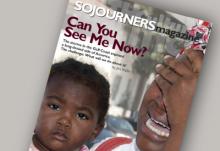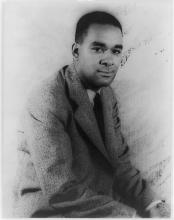Writing
God is in the details—or is it the devil? Authenticity certainly lurks there, which is abundant in the best fiction. Uwem Akpan understands this. When writing about Rwanda, he wanted to get the details right. Marriage customs, traditional dress, the color of the earth—the small, everyday matters that make a story come alive and that inhabitants of a place will spot right away if a writer gets it wrong. So Akpan attempted to travel to Rwanda for research.
But his superiors wouldn’t let him take the trip—they preferred that he remain at his seminary in Kenya. He was resigned to asking questions of his Jesuit brothers in letters and e-mails, and left to imagine Rwanda’s earth.
Akpan is most likely the first Nigerian Jesuit priest to have two stories published in The New Yorker, that Holy Grail for short story writers. “An Ex-Mas Feast” and the Rwanda story “My Parents’ Bedroom” are both featured in his first collection, Say You’re One of Them, published last June by Little, Brown and Company. In two novellas and three stories, he juxtaposes startlingly lucid writing and imagery with nearly unspeakable situations—child trafficking, genocide, religious and tribal divisions and violence, and desperate poverty. Each of the stories takes place in a different African country, and all are told through the perspectives of children.
Here’s the voice of 8-year-old Jigana at the opening of “An Ex-Mas Feast”: “Now that my eldest sister, Maisha, was 12, none of us knew how to relate to her anymore. She had never forgiven our parents for not being rich enough to send her to school.”
Mary Doria Russell’s science fiction books The Sparrow and Children of God put Jesuits in space and wrestle with the missionary issues of first contact. She’s gone on to write historical fiction, including A Thread of Grace, which tracks the underground efforts of Italians to save Jews during the final phase of World War II, and Dreamers of the Day, which explores the 1921 Cairo Conference through the perspective of an Ohioan woman caught up in forces that would shape the modern-day Middle East. Now Russell has jumped genres again and is writing a murder mystery/Western set in Dodge City, Kansas. Sojourners associate editor Rose Marie Berger interviewed Russell, who lives in Cleveland, this summer by e-mail.
Rose Marie Berger: How would you describe your spiritual journey?
Mary Doria Russell: Hardheaded. Pragmatic. Poetic. In that order!
How has your understanding of God changed over time? In 1955, the kindergarten kids at Pleasant Lane School in Lombard, Illinois, were told to bring in “something that is important to you” for show-and-tell. I remember this very clearly. A devout Catholic at that age, I arrived with a milk-glass statuette of the Virgin Mary and told the class that she was important to me because “she was the mother of God, and if it weren’t for her, there’d be no God, and then there’d be no world.”
Simply speaking those words aloud got my 5-year-old self thinking about the logical and sequential questions that statement begged. I became a more sophisticated Catholic as I matured, but eventually the theological package linking the Trinity, original sin, divine incarnation (with or without virgin birth), and salvation through blood sacrifice lost all credibility for me.

Exploring the difference between the public truth of the sermon and the private truth of the memoir.

Editor's note: In June 2006, Barack Obama, then a U.S. senator from Illinois, delivered a speech about the role of religion in politics at a conference sponsored by Sojourners/Call to Renewal. Obama spoke candidly about as his own Christian faith as well as the dangers of sectarianism in a pluralistic democracy; to this day it remains his most comprehensive speech on faith in the public sphere. Sojourners ran the following excerpt of Obama’s speech in our November 2006 issue.
I’d like to look at the connection between religion and politics and offer some thoughts about how we can sort through some of the often-bitter arguments that we’ve been seeing over the last several years. We can raise up the religious call to address poverty and environmental stewardship all we want, but it won’t have an impact unless we tackle head-on the mutual suspicion that sometimes exists between religious America and secular America—a debate we’ve been having in this country for the last 30 years over the role of religion in politics.
For some time now, there has been plenty of talk among pundits and pollsters that the political divide in this country has fallen sharply along religious lines. Indeed, the single biggest “gap” in party affiliation among white Americans today is not between men and women, or those who reside in so-called Red States and those who reside in Blue, but between those who attend church regularly and those who don’t. Conservative leaders have been all too happy to exploit this gap, consistently reminding evangelical Christians that Democrats disrespect their values and dislike their church, while suggesting to the rest of the country that religious Americans care only about the issues of abortion and gay marriage, school prayer and intelligent design.
Democrats, for the most part, have taken the bait. At best, we may try to avoid the conversation about religious values altogether, fearful of offending anyone and claiming that—regardless of our personal beliefs—constitutional principles tie our hands. At worst, there are some liberals who dismiss religion in the public square as inherently irrational or intolerant, insisting on a caricature of religious Americans that paints them as fanatical, or thinking that the very word “Christian” describes one’s political opponents, not people of faith.

The author of more than 40 books of fiction, poetry, and essays muses on farming as a writer and writing as a farmer.

Richard Wright was a political activist, but his loyalty was to his art.